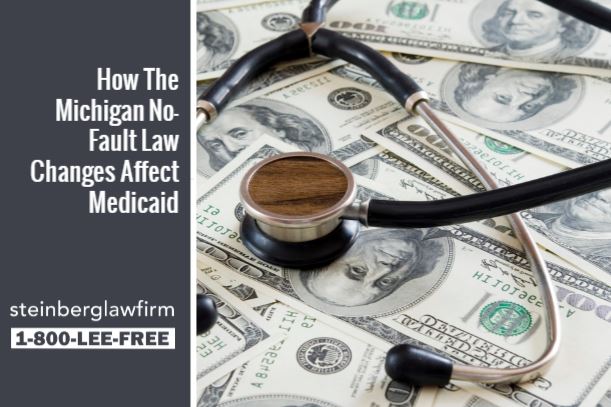
Bulletin #4 – What the Change in the No-Fault Law Means for Medicaid
On May 30, 2019, Governor Whitmer signed a major overhaul to the Michigan no-fault system, completely transforming Michigan car accident law. The legislation took effect on June 11, 2019 as Public Act 21 of 2019. There a number of huge ramifications for Michigan drivers, their families and anyone who uses a car, truck or motorcycle in this state.
Over the next few months I will be writing about these changes and the effects they will have on all of us. The new law becomes effective in different stages, so the impact will be incremental over time. Please call our office at 1-800 LEE-FREE (1-800-533-3733) with any questions about the new law. Our dedicated staff of Michigan car accident lawyers, paralegals and staff members are here to help.
This bulletin will evaluate the changes in who pays for auto accidents and what it means for our state’s Medicaid system.
Michigan Car Accident Law and Michigan Medicaid
Beginning on June 11, 2019, changes to which insurance carriers are responsible for the payment of Michigan no-fault benefits took effect. These changes will become even more drastic on July 1, 2020, when auto insurance carriers in Michigan will begin selling limited PIP coverage options to motorists.
Currently, under the Michigan no-fault law, for most individuals there is no limit on PIP (personal injury protection) coverage. This means auto insurance carriers must pay for all auto accident related medical bills and treatment, no matter the amount of expenses incurred. In addition, under current law, Medicaid is not responsible or primary for the payment of medical expenses incurred due to a car or truck accident.
However, this all changes under the new law. Under MCL 500.3107c(a)(i), those who are Medicaid eligible can purchase no-fault coverage of only $50,000. When the $50,000 is exhausted, the Medicaid beneficiary will return to Medicaid for the payment of medical expenses. In other words, Medicaid becomes primary for the payment of auto accident expenses.
So in reality, Medicaid beneficiaries who choose the limited $50,000 PIP option are limiting their ability to seek medical treatment after a Michigan car crash. Given the high cost of hospital visits, physical therapy, rehabilitation and other types of treatment, the PIP coverage will run out quickly. Car wreck victims will then have to return to Medicaid doctors and Medicaid treatment facilities. This is not the best outcome.
Beginning June 11, 2019, individuals injured in a motor vehicle accident who are not covered by auto insurance, do not resident with a resident relative who is insured with auto insurance, or is not covered by another applicable auto policy, must turn to the Michigan Assigned Claims Plan (MACP) for the payment of no-fault benefit. However, persons covered by the MACP will be limited to $250,000 in coverage. Once that coverage is exhausted, these folks will have to turn to private health insurance, or Medicaid if they are eligible, for the payment of auto accident related expenses.
Again, car crash victims in Michigan in this situation will be forced to change doctors, therapists, and medical facilities once the PIP coverage runs out.
Financial Effect on Michigan Residents
The changes to the Michigan No-Fault Law are going to have a large effect on the finances of the state, increasing the burden on taxpayers and the state’s finances. According to the Senate Fiscal Agency, Medicaid costs will increase $70 million over a ten-year period. This is because the costs associated from a car accident doesn’t just disappear because the law changed. Instead, taxpayers like you and me will be footing the bill instead of the large car insurance carriers.
However, even the $70 million figure Senate Fiscal Agency arrived at may be under stating the true cost of the no-fault law change on our state’s Medicaid system. Medicaid costs over time will be higher if there is less interest in individuals purchasing unlimited PIP coverage. Naturally, given the fact most people will select limited PIP coverage options, such as the $250,000 limit, the cost for unlimited PIP will increase dramatically. This will make it even more unlikely policyholders will select unlimited PIP, thereby making it more likely Medicaid will end up paying auto accident claims.
This author thinks the state is severely underselling the true cost of moving the payment of medical costs from the car insurance carriers to Medicaid.
Call Lee Free With Your No-Fault Questions
I will write about this and other changes to Michigan auto accident law more in future articles. However, if you have any questions about the new Michigan No-Fault Law, or have any questions about a Michigan car crash in general, please call our dedicated team of Michigan car wreck injury lawyers today at 1-800-LEE-FREE (1-800-533-3733). We are standing by, ready to serve and assist you.
